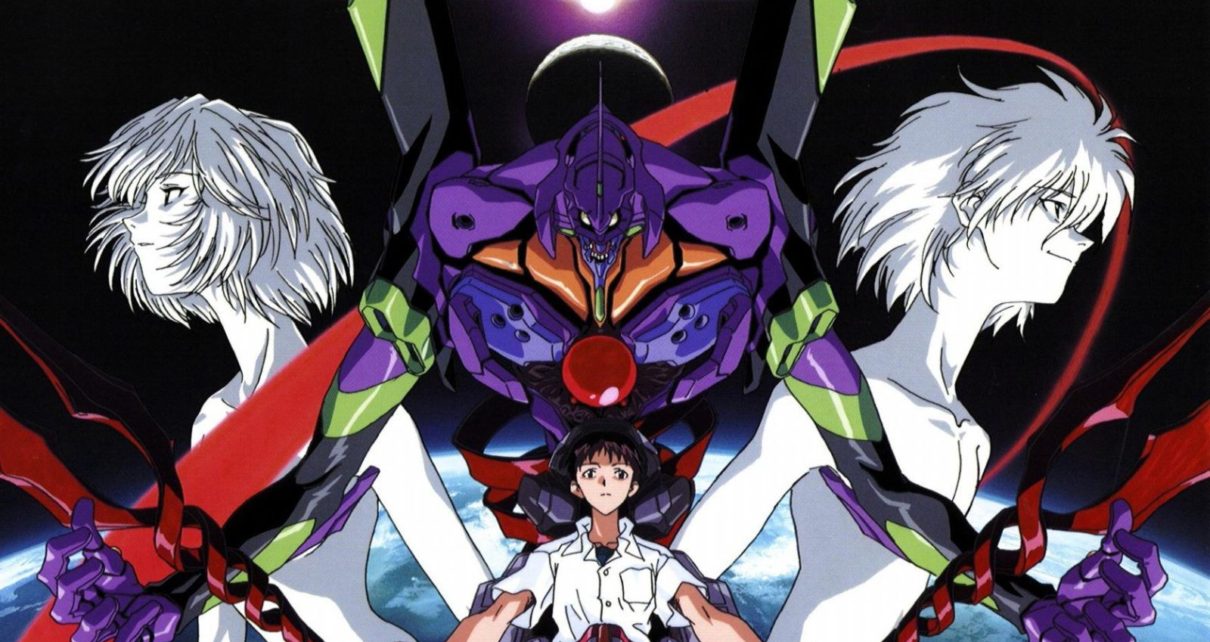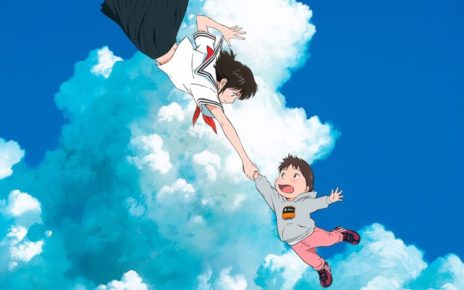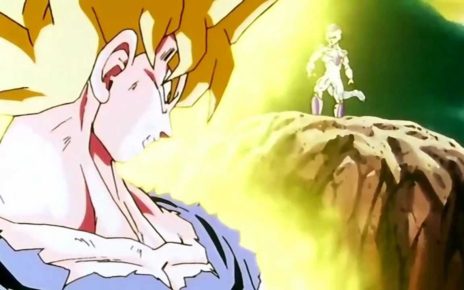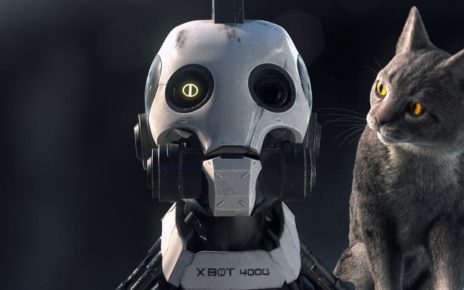June 21 marks the release of Neon Genesis Evangelion’s original 26-episode run (1995-1996) and two of its films on Netflix, bringing a show that has been essentially inaccessible to American viewers for years back to their television sets. NGE made a brief appearance, heavily censored, on Cartoon Network’s original Toonami lineup during a specialty programming block for one weekend in 2003, and then again on Adult Swim for about six months beginning in October 2005. Otherwise, stateside anime fans looking to watch it had only a few choices: dish out serious cash for increasingly rare out-of-print DVD releases, binge low-resolution episodes on YouTube before they are removed hours later, or sailing the seven seas of shady links and illegal downloads.
That’s changed now that Netflix will finally bring NGE to its anime-hungry subscribers in the pristine (HD!) quality fans demanded. This means that one of the most influential anime in history will have a chance to gain a whole new audience, literally overnight. That invites some questions. They say absence makes the heart grow fonder, but what does that mean when a majority of your subscriber base has been clueless to this show’s very existence? What results does a show like NGE—a beloved cult hit in the U.S., but a titanic property in the Eastern hemisphere—get from gaining a bigger platform so long after its original run?
Let’s start with the basics. At its root, Neon Genesis Evangelion is a mecha anime, involving giant robots called EVAs fighting giant aliens called Angels. That sounds simple enough for the average viewer, but the devil’s always in the details with shows like this. In its 26 episodes and film finale, director Hideaki Anno makes every minute count and then some. The show’s universe is as deeply packed as the Mariana Trench with world-building, symbolism, and observations on the human condition, and a lot can be lost on the first watch.
Anyone trying to keep up with the show’s dense plot by watching in single half-hour chunks weekly would be hard pressed to keep up. But this is why NGE is perfect for Netflix.
One thing that will benefit newcomers to the series is the sheer obsessiveness of its hardcore fans, who have taken it upon themselves to archive and analyze the show from top to bottom in every way imaginable. I’ve watched the entire series end to end dozens of times since I first purchased my box set (yep, I shelled out) and I still couldn’t tell you the names of more than two of the Angels the protagonists fight. Luckily, every single facet and factoid is archived on fan wiki pages, where the show is broken down with textbook precision. With all this information readily available a few taps away on a smartphone, the unique relationship between viewer and show enjoyed in the digital age of television will be extraordinarily beneficial.
Then there’s the bingeing angle. Anyone trying to keep up with the show’s dense plot by watching in single half-hour chunks weekly would be hard pressed to keep up. But this is why NGE is perfect for Netflix. Audience control over viewing habits and the ability to pause to take a quick glance at the wiki) make for a potent one-two punch.The pause button combined with the devotion of altruistic fans may be the greatest strengths Neon Genesis Evangelion has gained from its time apart from America.
We’re also deep in the television’s Golden Age, and with the rise of adult-focused programming over the past two decades, NGE’s brutality should prove far more palatable for the average viewer than it did during its initial run. Game of Thrones may have ended wretchedly there’s no doubt that its effect on American audiences will ripple for years to come, especially in terms of how much violence and sex a show can get away with without major backlash. For comparison, consider this: a year before NGE was first shown (in heavily-censored form) in America, ER used the word “shit” once on network television, and the episode ran a disclaimer about the show’s “strong language.” Today, Theon Greyjoy can be tortured on television for a full season on the country’s most popular television phenomenon.
Evangelion doesn’t have any genital mutilation or finger nail removal, but mechs murdering giant aliens is par for the course and happens in ways that are, if you squint, as brutal as your average ’80s slasher film. The squeamish may end up staying away, but it’s fair to say that the Parents Television Council won’t be popping up on CNN to talk about picketing Netflix’s offices. And that’s not even mentioning the show’s focus on teens exploring their adolescent sexuality, warts and all. Whether it be seeing someone of the opposite sex naked for the first time or trying to understand what a real relationship is between two consenting adults, it’s fair to say Hideaki Anno wasn’t taking his cue from ’50s sitcoms. Protagonist Shinji Ikari’s whole arc in the series finale film End of Evangelion may be the greatest condemnation of toxic masculinity and male entitlement in all of anime—a form that has gotten its fair share of criticism for the way it portrays sex and sexuality. Given American society’s turn toward intersectional feminism as represented by the #MeToo movement and the challenging of gender norms and expectations, it’s safe to say that Neon Genesis Evangelion may was very ahead of its time—but in 2019, we’re ready for a show pointing out to otakus that their entitlement is poisonous.
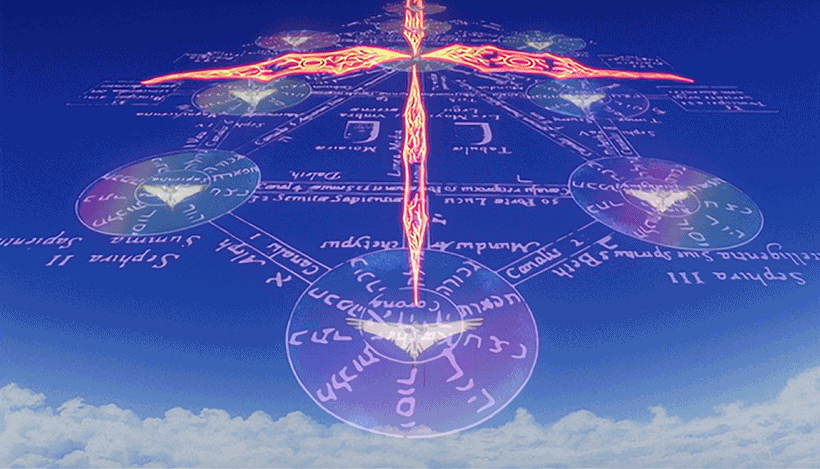
There are concerns, though. American shows don’t traffic in complex symbolism in the way that they used to—or at least their audiences aren’t understanding it. It’s been nearly two years since Darren Aronofsky’s mother! came and went in theaters, bringing with it a near-impossible F score from CinemaScore and a Hollywood Reporter review arguing that “if you need to Google search the meaning of movie when you get home, it was a failure.” This utter rejection of a film built entirely on symbolism concerns me, as NGE is teeming with religious subtext, allegory, and symbols, some of which don’t have roots in mainstream Judeo-Christian theology. With most blockbusters only willing to bring in references to Jesus and a tiny bit of Moses or Adam and Eve with their stories, it’s a mystery how much End of Eva will resonate when the climax involves the protagonist’s mech surrounded by the villains’ creations in the shape of Kabballah’s Sefirot Tree of Life.
Let’s be clear: This is a show that utilizes religious iconography from episode one, employing pieces from the Dead Sea Scrolls, deep pulls from the Torah, and representations of New Testament apocrypha. In other words, these are references not even your average Catholic school student could even keep up with. It’s not outlandish to worry that the contemporary internet’s preference for clicks over substance will lead to a proliferation of shallow “explainer” videos rather than actual critical explication. YouTube is flooded with “[Insert Title Here] ENDING EXPLAINED!” videos with red arrows and emojis in the thumbnails minutes after a big blockbuster or episode first screens, and NGE will absolutely not be excluded from this trend.
Granted I don’t believe Anno expected this show’s audience to be comprised only of seminary graduates to watch, but his peculiar Old Testament obsessions may drive some viewers a little batty. The symbolism Evangelion so liberally uses doesn’t have one concrete explanation, and new viewers may have trouble accepting that. The hope is that viewers can leave their TV sets or computers feeling something.
Netflix’s release has been a long time coming for devout anime fans, but the streaming service definitely wants to get new eyes on one of the most acclaimed pieces of Japanese culture. It’s impossible to know what will resonate, what will fall to the wayside, and what will end up getting memed to death, and Twitter, Facebook, and Reddit are going to be an interesting sight to behold once the show drops. This is not a show that elicits tepid reactions in its audience. At the very least, it’s guaranteed to raise a collective eyebrow. My hope is that new viewers, armed with technology and years of fan obsession, take the time to engage with Neon Genesis Evangelion, to figure out what resonates with them and why right now could not be a more perfect time to fall head-first into this show.
Thanks for reading The Dot and Line, where we talk about animation of all kinds. Don’t forget to follow us on Twitter and sign up for our newsletter.


